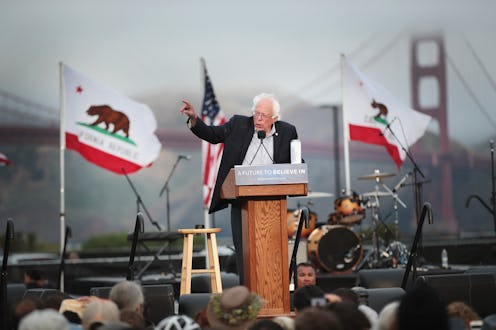With over 800 delegates remaining in the Democratic primary race, Bernie Sanders wasn't nearly ready to call it quits when Hillary Clinton was pronounced the party's presumptive presidential nominee. If he plays his cards right and wins popular support in the last primaries of the season, Sanders could acquire enough delegates to swipe Clinton's nomination. But "slim" doesn't even begin to describe his chances.
Prior to the last major round of primaries on June 7, 95 superdelegates remain publicly uncommitted, and the remaining seven states offer 714 pledged Democratic delegates. Sanders trails Clinton by 291 pledged delegates and 523 unpledged delegates. This disproportional allocation of superdelegates is the reason for most, if not all of the fuss.
As this election has shown, superdelegates from each state do not side with the majority, and Sanders will try to use this to his advantage. If they did correspond proportionally to the number of pledged delegates won by each candidate, he would have 282 superdelegates and Clinton would have 337. The math involves multiplying the number of decided superdelegates by the percentage of pledged delegates each candidate has won thus far. In fact, before some delegates had a change to see who won major primary states like California and New Jersey, they chose to side with Clinton.
If anything, the Associated Press' premature announcement regarding Clinton's nomination, which depended wholly on superdelegates, justified Sanders' distaste for the less democratic parts of the system. In a discussion between The New York Times' Nate Cohn, The Upshot’s elections analyst, and Toni Monkovic, an Upshot editor, Cohn explained why the announcement is fueling Sanders' supporters:
Yeah, it’s hard to think of many worse ways for Hillary Clinton to get here. Here’s this historic moment — the first woman to win a major party nomination — and it catches everyone by surprise, and they have to downplay it. It feeds into the notion that the whole thing is rigged.
If the race indeed comes down to the superdelegate count, Sanders could spark a contested convention, and many experts, such as Monkovic, believe he will try. Let's say each candidate takes home half of the remaining 714 pledged delegates. Neither's pledged delegate count will have reached 2,383. According to RealClearPolitics' polling averages, that ratio is an optimistic stretch, but certainly not impossible, considering how Sanders is only two points below Clinton in California. Stepping up to the National Convention stage, Sanders would have to convince at least 458 superdelegates to support him. If he swayed the 95 uncommitted superdelegates remaining, that means he would still have to snag 363 of Clinton's already committed superdelegates.
As Nate Silver mentioned in an article analyzing Clinton's chances of winning the nomination without superdelegates, it's extremely unlikely that Sanders will win enough pledged delegates to justify winning the nomination. Currently, Clinton has 1,812 pledged delegates, and if she takes just 215 additional ones, she will have won the majority of the 4,051 in the race. Unlike her superdelegates, the pledged delegate count more accurately reflects the people's vote, and will be much more difficult for Sanders to refute.
